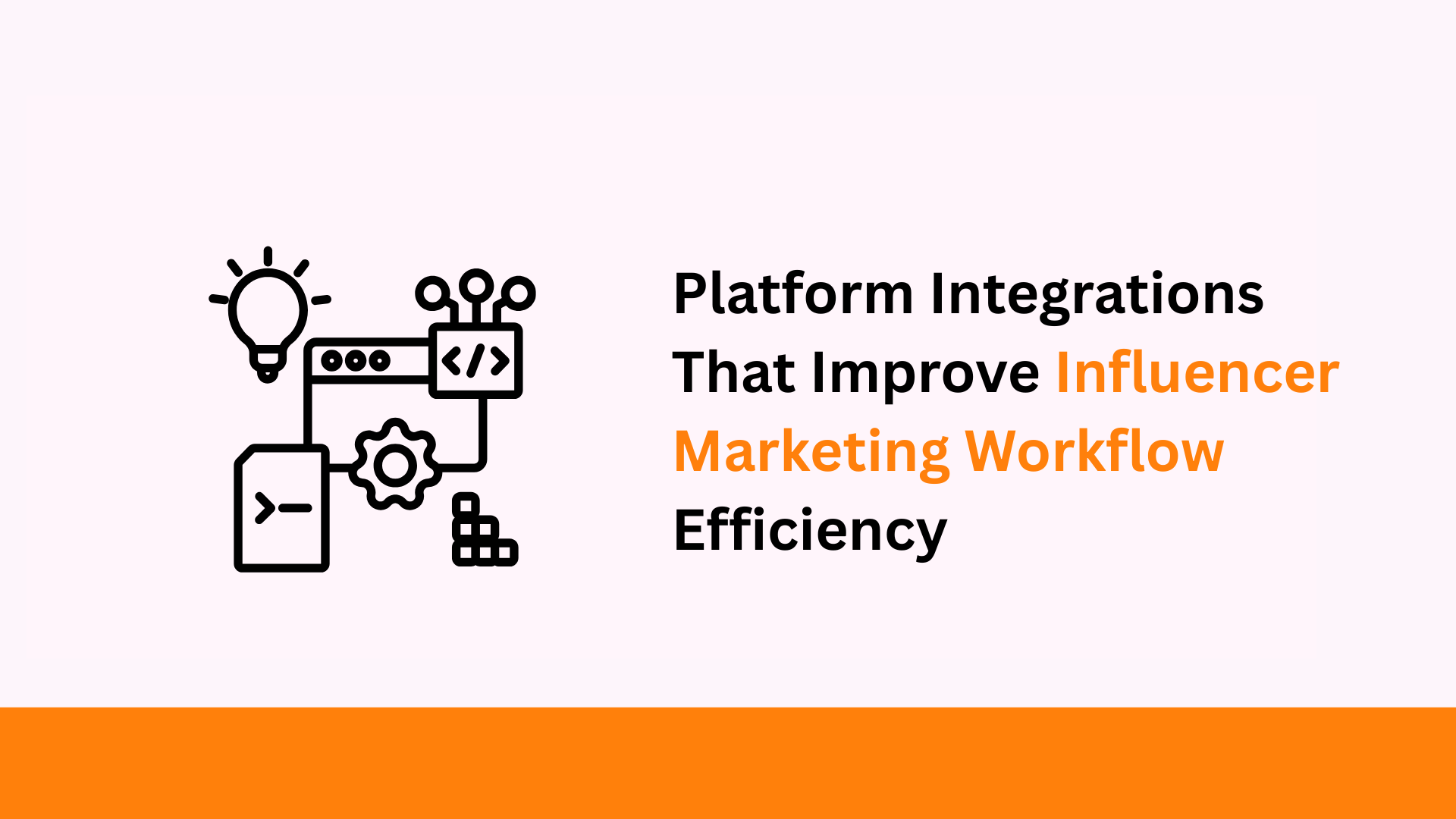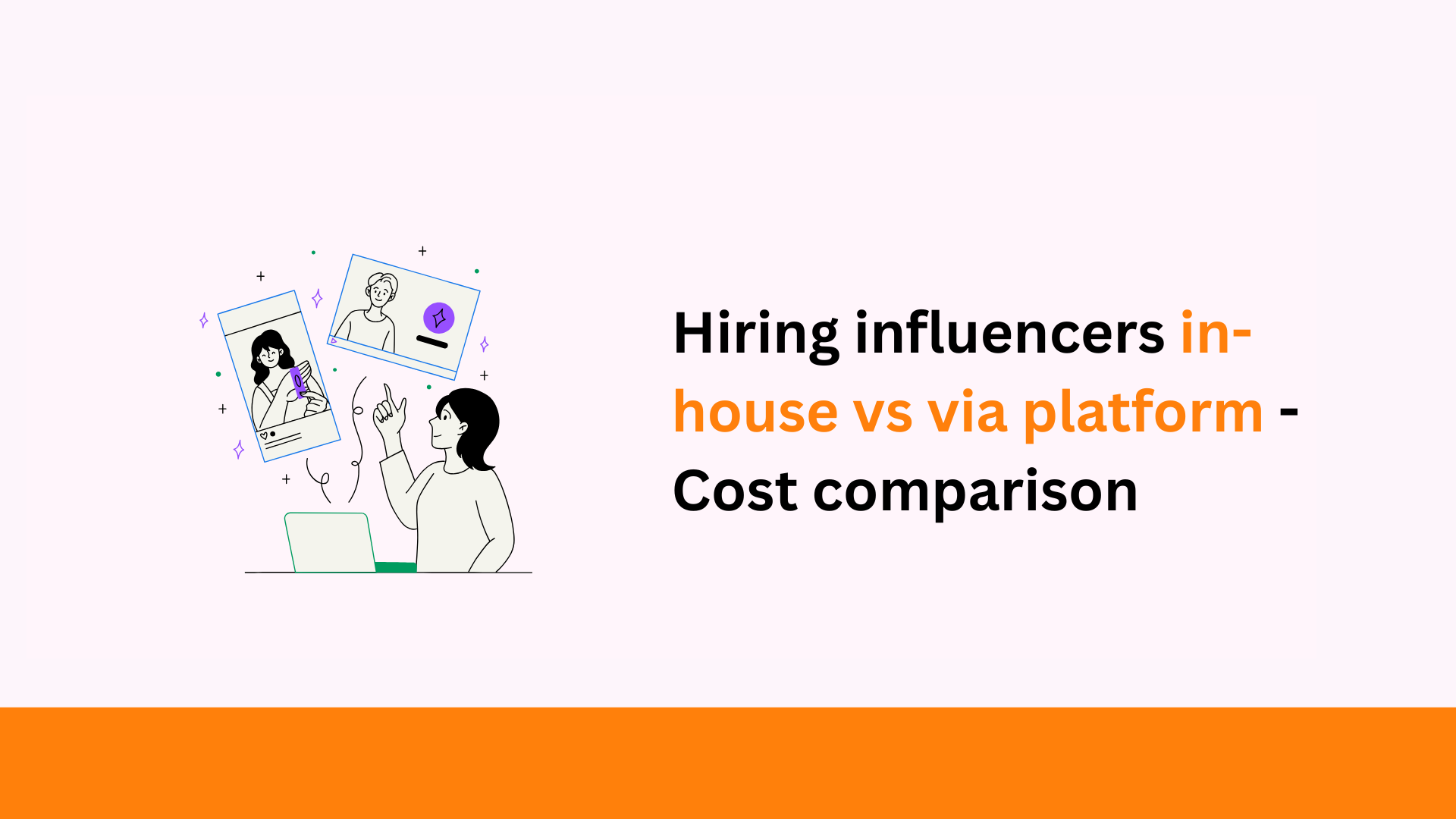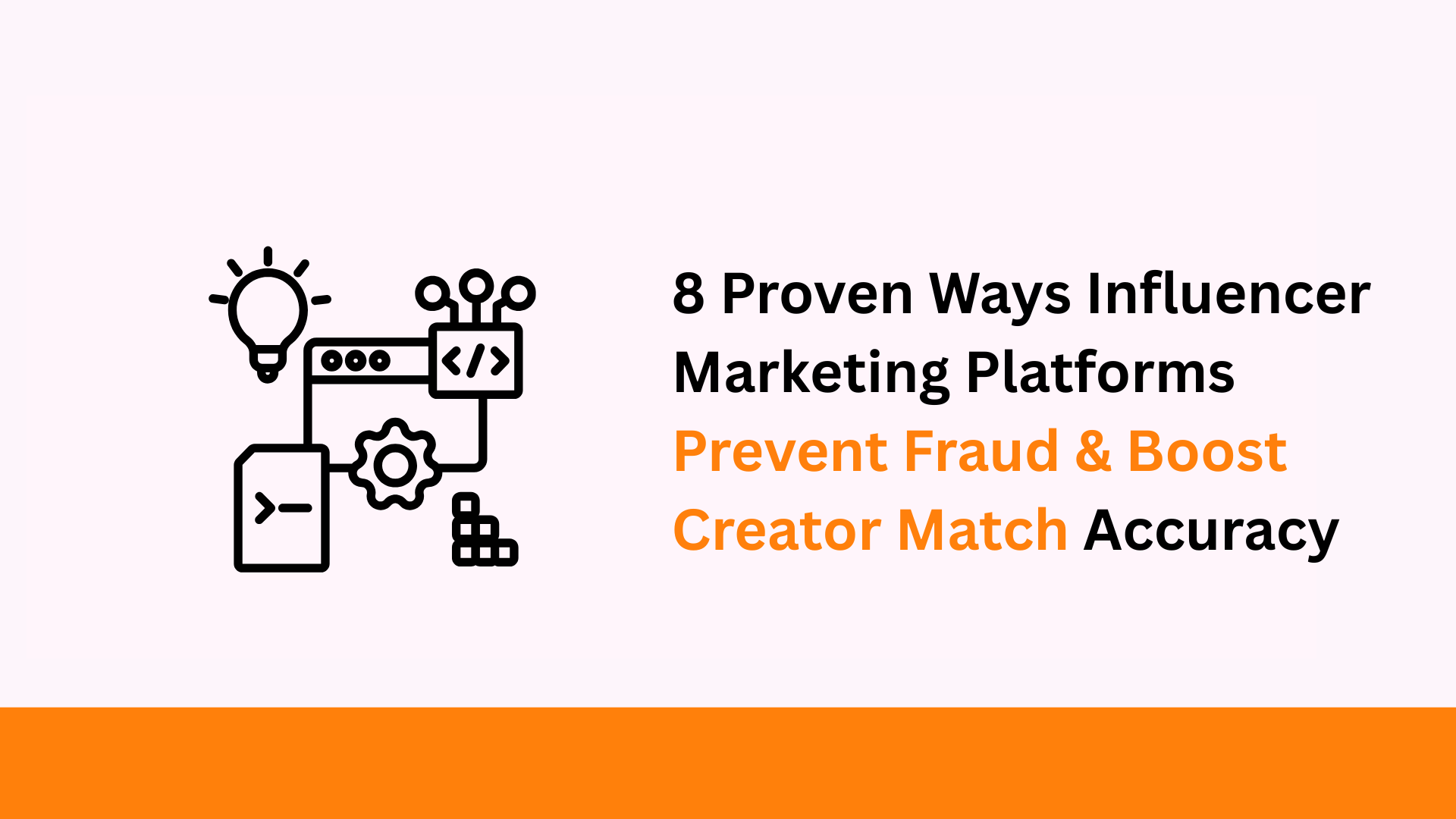TL;DR
- Integrating your influencer marketing platform with other tools like CRM systems, analytics dashboards, and social media platforms streamlines operations and reduces manual work
- These integrations eliminate data silos, automate routine tasks, and provide real-time performance insights
- Marketing teams save an average of 15 hours per week through proper platform integrations
- The most valuable connections link influencer platforms with CRM tools, analytics systems, social media platforms, and payment processors
Why Workflow Efficiency Matters in Influencer Marketing
In 2025’s fast-paced digital landscape, workflow efficiency isn’t just nice to have—it’s essential for survival. Influencer marketing campaigns involve multiple moving parts: finding the right creators, negotiating contracts, approving content, tracking performance, and measuring ROI. Without streamlined workflows, these processes quickly become bottlenecks.
Marketing teams waste up to 20% of their work week on manual tasks that could be automated through proper platform integrations. This translates to approximately 8 hours per week per team member that could be spent on strategic initiatives instead.
Workflow efficiency in influencer marketing delivers three key benefits:
- Time savings: Teams complete campaigns 30% faster when using integrated platforms
- Cost reduction: Organizations save an average of 15-20% on campaign management costs
- Enhanced campaign performance: Integrated workflows lead to 25% higher engagement rates
The most successful influencer marketing teams aren’t necessarily the ones with the biggest budgets—they’re the ones that optimize their workflows through strategic must-have features in 2025 (based on usage data and feedback) integrations.
Key Areas for Workflow Optimization
Before diving into specific integrations, it’s important to identify the processes that benefit most from optimization:
- Influencer discovery and vetting: 65% of marketers report spending the most time on finding and evaluating potential influencers. Integrations that streamline this process have the highest ROI.
- Content approval and feedback: The average campaign requires 5-7 rounds of revisions before content goes live. Platforms that integrate feedback tools can cut this time in half.
- Performance measurement: Marketing teams spend approximately 12 hours per month compiling reports from various sources. Automated reporting through integrations reduces this to just 2 hours.
These workflow pain points represent the greatest opportunities for efficiency improvements through strategic platform cost comparison: hiring influencers in-house vs via platform integrations.
How Integrations with CRM Systems Improve Campaign Management
The integration of influencer marketing platforms with CRM systems creates a powerful ecosystem that transforms campaign management.
According to a 2024 survey by Influencer Marketing Hub, brands using CRM-integrated influencer platforms report 42% higher retention rates with their creator partners. This integration eliminates the information silos that plague marketing teams.
Here’s what happens when your influencer platform talks to your CRM:
- Unified influencer profiles: All creator data, including past performance, payment history, and communication logs, lives in one accessible location
- Automated relationship tracking: The system flags when relationships need nurturing or when follow-ups are due
- Streamlined approvals: Contract approvals and content sign-offs flow through a single system with automatic notifications
- Enhanced reporting: Campaign performance data automatically populates in CRM dashboards alongside other marketing metrics
The most significant advantage of CRM integration is the 360-degree view it provides of your influencer relationships. Marketing teams gain platform integrations that improve workflow efficiency capabilities, enhancing their entire campaign process.
Benefits of CRM Integration for Influencer Campaigns
- Enhanced relationship management: Teams with CRM-integrated influencer platforms report 37% higher satisfaction scores from creators, who appreciate the consistent communication and organized approach.
- Improved contract compliance: Automated reminders and milestone tracking reduce deadline misses by 43%, ensuring campaigns stay on schedule.
- Better lead generation: When influencer campaigns generate leads, they flow directly into the CRM for immediate follow-up. This results in 28% higher conversion rates compared to non-integrated systems.
- Data-driven decision making: With all campaign data in one place, marketers can easily identify which influencer relationships deliver the highest ROI and adjust future campaigns accordingly.
| CRM Integration Benefits | Without Integration | With Integration |
| Time spent on influencer relationship management | 12 hours/week | 4 hours/week |
| Average response time to influencers | 36 hours | 8 hours |
| Campaign completion on schedule | 68% | 94% |
| Lead conversion rate | 2.3% | 3.9% |
| Renewal rate with influencers | 51% | 73% |
These improvements show why smart brands are prioritizing real ways platforms prevent Fraud & boost creator match accuracy through integrated systems that verify and manage creator relationships.
Integrating with Analytics Tools for Better Data and Reporting
In today’s data-driven marketing landscape, the integration between influencer platforms and analytics tools is transformative. When your influencer marketing platform connects with Google Analytics, social media insights tools, and business intelligence platforms, you gain unprecedented visibility into campaign performance.
A 2024 report from eMarketer found that marketers who integrate their influencer platforms with analytics tools see a 34% improvement in campaign ROI. This isn’t surprising when you consider the wealth of insights these integrations provide.
Key benefits of analytics integrations include:
- Real-time performance tracking: No more waiting until campaign completion to assess results. Integrated analytics provide daily or even hourly updates on key metrics.
- Attribution clarity: Analytics integrations help solve the attribution puzzle, showing exactly how influencer content contributes to conversions through multi-touch attribution models.
- Competitive benchmarking: Advanced analytics integrations can pull in industry benchmarks, showing how your campaigns perform relative to competitors.
- Predictive optimization: The most sophisticated integrations use AI to predict which content and influencers will perform best, enabling mid-campaign adjustments.
These analytics capabilities have become essential Must-Have Features in 2025 (based on usage data and feedback) for serious influencer marketers looking to maximize their ROI.
How Analytics Integrations Drive More Informed Campaign Decisions
The true power of analytics integrations lies in their ability to transform decision-making. Marketing teams with integrated analytics make adjustments 4x faster than those working with siloed data systems.
Consider these real-world impacts:
- Budget optimization: Analytics integrations help identify which creators deliver the highest return, allowing for real-time budget shifts. Brands report saving 18-22% of campaign budgets through this dynamic allocation.
- Content refinement: When content isn’t performing as expected, analytics integrations flag the issue immediately. Teams can then guide creators, resulting in a 31% performance improvement for underperforming content.
- Audience insights: Integrated analytics reveal which audience segments respond best to influencer content. This enables hyper-targeting in future campaigns, increasing engagement rates by up to 47%.
These improvements demonstrate why more brands are making cost comparisons: hiring influencers in-house vs via platform calculations that favor integrated platforms with robust analytics.
Social Media Integrations: Streamlining Content Management
The direct integration between influencer marketing platforms and social media channels creates perhaps the most significant workflow efficiency improvement. These integrations eliminate the constant platform-switching that plagues marketing teams.
According to a 2024 survey by Social Media Examiner, marketing teams that use platforms with social media integrations complete campaigns 40% faster than those without such integrations.
Modern social media integrations offer:
- Direct content approval: Review and approve influencer content without leaving your influencer marketing platform
- Consolidated performance data: View metrics from Instagram, TikTok, YouTube, and other platforms in a single dashboard
- Automated content scheduling: Schedule posts across multiple platforms from one interface
- Comment and engagement monitoring: Track and respond to audience engagement from within your influencer platform
These capabilities help marketing teams implement real ways platforms prevent fraud & boost creator match accuracy protocols by verifying real engagement and authentic content.
Content Approval and Scheduling: How Integrations Save Time
The content approval process represents one of the biggest bottlenecks in influencer marketing. Without integrated systems, marketing teams waste hours switching between email, messaging apps, and social platforms to review and approve content.
Social media integrations streamline this process by:
- Centralizing feedback: All stakeholders can provide content feedback in one location
- Creating approval workflows: Automated workflows ensure the right people review content at the right time
- Tracking version history: No more confusion about which version is the latest
- Setting automatic publishing: Once approved, content can be scheduled to publish automatically
The impact is substantial: brands using platforms with robust social media integrations reduce their content approval time by 65% and decrease publication errors by 83%.
These improvements showcase why platform integrations that improve workflow efficiency have become a critical consideration for marketing teams selecting influencer platforms.
Managing Payments and Contracts: Streamlining Legal Workflows
Perhaps no area of influencer marketing creates more friction than payments and contracts. Integrating payment processors (like RazorpayX, Bank transfer) and electronic signature tools (like DocuSign or Adobe Sign) with your influencer platform eliminates these pain points.
A 2024 study by Influencer Marketing Hub found that influencer payment delays are the #1 reason for relationship breakdowns between brands and creators. Integrated payment systems reduce payment time from an industry average of 45 days to just 7 days.
The benefits of payment and contract integrations include:
- Automated payment triggers: Payments can be automatically initiated when campaign milestones are met
- Multiple payment options: Creators can choose their preferred payment method
- Contract templating: Legal teams can create pre-approved contract templates that marketers can use without legal review
- Electronic signatures: No more printing, signing, scanning, and emailing contracts
These integrations don’t just improve efficiency—they dramatically enhance creator relationships. Influencers consistently rank “prompt payment” as their #2 factor (after fair compensation) in deciding whether to work with a brand again.
These payment capabilities have become Must-have features in 2025 (based on usage data and feedback) for brands serious about building lasting creator relationships.
The Future of Platform Integrations in Influencer Marketing
As we look ahead to the remainder of 2025 and beyond, several emerging trends will reshape platform integrations in influencer marketing:
- AI-powered workflow optimization: Machine learning algorithms will analyze workflow patterns and suggest customized integration setups based on team behavior.
- Blockchain-based contract and payment systems: Several major platforms are exploring blockchain technology for transparent, immutable contract records and instantaneous payments.
- Expanded API ecosystems: Leading platforms are opening their APIs to encourage third-party developers to create specialized integrations for niche needs.
- Predictive performance modeling: Advanced analytics integrations will not just report on past performance but predict future outcomes with increasing accuracy.
- Voice-activated workflow commands: Voice interfaces will allow marketers to trigger actions across integrated platforms using natural language commands.
These innovations promise to further reduce manual work and allow marketing teams to focus on strategy rather than execution. Early adopters of these advanced integrations report saving an additional 10-15 hours per week compared to teams using current integration technology.For more information on the latest platforms incorporating these integrations, check out the best influencer marketing platforms in 2024.
FAQs
- What are the key integrations that can improve workflow efficiency in influencer marketing?
The most valuable integrations connect influencer platforms with CRM systems, analytics tools, social media platforms, and payment/contract systems. Marketing teams implementing all four integration types see up to 76% improvement in workflow efficiency.
- How do CRM integrations benefit influencer marketing campaigns?
CRM integrations create a single source of truth for all influencer relationships and campaign data, improving relationship management, enhancing contract compliance, and enabling data-driven decision making.
- How do analytics integrations enhance campaign performance?
Analytics integrations provide real-time data, clear attribution models, and predictive capabilities that enable faster adjustments, more efficient budget allocation, and more effective audience targeting.



